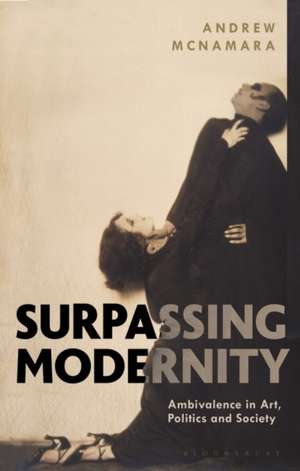Surpassing Modernity: Ambivalence in Art, Politics and Society
Autor Andrew McNamaraen Limba Engleză Paperback – 28 noi 2018
| Toate formatele și edițiile | Preț | Express |
|---|---|---|
| Paperback (1) | 172.27 lei 6-8 săpt. | +42.64 lei 5-11 zile |
| Bloomsbury Publishing – 28 noi 2018 | 172.27 lei 6-8 săpt. | +42.64 lei 5-11 zile |
| Hardback (1) | 538.77 lei 6-8 săpt. | |
| Bloomsbury Publishing – 28 noi 2018 | 538.77 lei 6-8 săpt. |
Preț: 172.27 lei
Preț vechi: 199.97 lei
-14% Nou
Puncte Express: 258
Preț estimativ în valută:
32.96€ • 34.50$ • 27.44£
32.96€ • 34.50$ • 27.44£
Carte tipărită la comandă
Livrare economică 31 martie-14 aprilie
Livrare express 22-28 februarie pentru 52.63 lei
Preluare comenzi: 021 569.72.76
Specificații
ISBN-13: 9781350008342
ISBN-10: 1350008346
Pagini: 264
Ilustrații: 9 b&w illus
Dimensiuni: 138 x 216 x 26 mm
Greutate: 0.34 kg
Editura: Bloomsbury Publishing
Colecția Bloomsbury Academic
Locul publicării:London, United Kingdom
ISBN-10: 1350008346
Pagini: 264
Ilustrații: 9 b&w illus
Dimensiuni: 138 x 216 x 26 mm
Greutate: 0.34 kg
Editura: Bloomsbury Publishing
Colecția Bloomsbury Academic
Locul publicării:London, United Kingdom
Caracteristici
Includes analysis of artwork from significant contemporary artists such as Sigmer Polke
Notă biografică
Andrew McNamara is an art historian and Professor, Visual Arts at Queensland University of Technology, Australia. His publications include: Sweat-the subtropical imaginary (2011); An Apprehensive Aesthetic (2009); Modern Times: The Untold Story of Modernism in Australia, with Ann Stephen and Philip Goad (2008). He is a Fellow of the Australian Academy of the Humanities.
Cuprins
Introduction: the Surpassing Paradigm PART ONE Chapter OneWhat Are We Talking About? A Landscape in which Nothing was the Same Except the Clouds Chapter TwoPetty-bourgeois Revolutionaries: Reflections on Polke's Wir Kleinbürger! (We Petty Bourgeois!) Chapter ThreeWhat is Art Supposed to Do? The Modernist Legacy, the Arab Spring, a Censorship Case in Sharjah, and Artist Arrests in the Year of the Protestor Chapter FourInversions, Conversions, Aberrations: Visual Acuity and the Erratic Chemistry of Art-historical Transmission in a Transcultural Situation Conclusion Bibliography
Recenzii
Andrew McNamara has written a compelling book that situates the thirst for novelty that grew among vanguardist, cosmopolitan elites in the late 1980s and 1990s. Directing their animus against modernism, these thinkers, art historians and artists strove for a surpassing of the allegedly oppressive principles of modernist aesthetics. The novelty of surpassing modernism has worn off in an age of austerity, when the social democratic institutions that supported modernist experiments are in decay. McNamara does not offer a new term with which to deal with the historical thirst for the new: working in a highly interdisciplinary manner, he frames globalization of contemporary art practices in revealing and disquieting ways.
Andrew McNamara has made a timely and important intervention in debates about the nature of contemporary art, and its contested relationship to the tradition of modernism. His book represents a challenge to many received ideas about that relation, and offers stimulating new perspectives for thinking about art in a global context.
McNamara's critical examination of the wish to "surpass" a period or movement defined as "modernist" argues that such redundant one-upmanship is futile. A new critical vocabulary is needed to avoid conceptual dead-ends. Analyses of practices defined as "anti-aesthetic" or "contemporary" take us from Sigmar Polke to Mustapha Benfodil, from Pussy Riot to Ai Wei Wei, from Doha to Sharjah and Australia. Biological or chemical ways of thinking can push art history beyond the surpassing mode. McNamara is always passionate, infectious, challenging and brilliant. Surpassing Modernity will leave a lasting mark.
Andrew McNamara has made a timely and important intervention in debates about the nature of contemporary art, and its contested relationship to the tradition of modernism. His book represents a challenge to many received ideas about that relation, and offers stimulating new perspectives for thinking about art in a global context.
McNamara's critical examination of the wish to "surpass" a period or movement defined as "modernist" argues that such redundant one-upmanship is futile. A new critical vocabulary is needed to avoid conceptual dead-ends. Analyses of practices defined as "anti-aesthetic" or "contemporary" take us from Sigmar Polke to Mustapha Benfodil, from Pussy Riot to Ai Wei Wei, from Doha to Sharjah and Australia. Biological or chemical ways of thinking can push art history beyond the surpassing mode. McNamara is always passionate, infectious, challenging and brilliant. Surpassing Modernity will leave a lasting mark.
